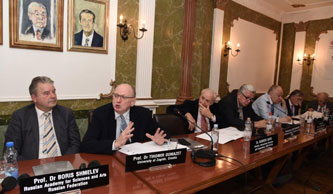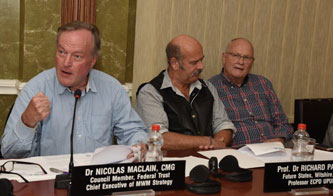XV ECPD International Conference
THE UN AGENDA 2030
TO TRANSFORM THE WORLD
(Belgrade City Hall, 25 October 2019)
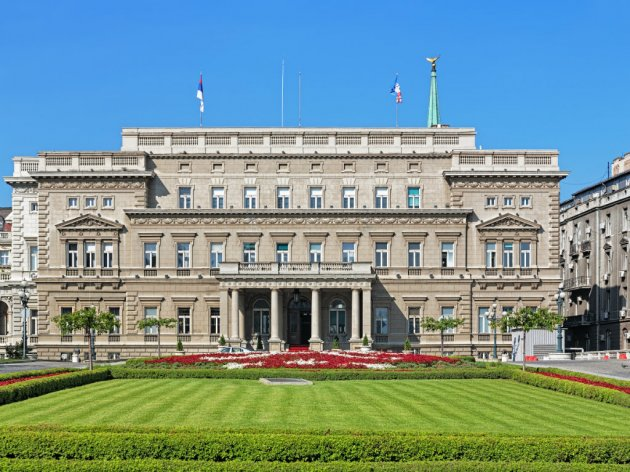
(Belgrade City Hall, 25 October 2019)

The European Center for Peace and Development (ECPD) University for Peace established by the United Nations, organized its fifteenth annual international conferences in a new thematic framework on the Future of the World between Globalization and Regionalization. The theme this year was “The UN Agenda 2030: To Transform the World”, building on the United Nations 2030 Agenda for Sustainable Development adopted at a General Assembly summit in 2015, which mapped out the fundamental transformations required by 2030 to address the many interrelated problems that the world is facing. The conference assembled many partners and friends both from the region and around the world, across many fields and the political, religious, academic and development domains. It aimed to achieve a deeper and wider understanding of the next essential directions to transform the region in order to build a more sustainable future.
At the heart of Agenda 2030 are 17 Sustainable Development Goals (SDGs) that integrate the economic, social and environmental challenges facing the world, and that put humans back at the centre, with the aim to leave no one behind. These were explored in the conference from various perspectives.
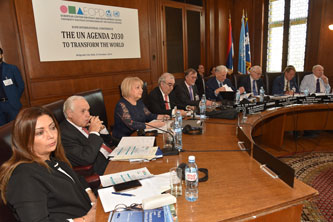 .
. 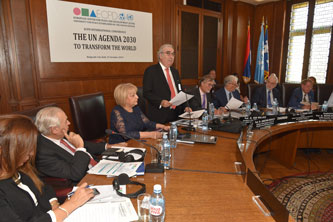 .
. 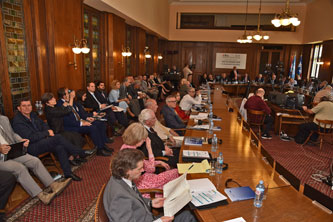
The opening session reflected a balance of realistic appraisals of the present situation in the world, while acknowledging glimmers of hope and optimism in constructive efforts to respond.
H.E. Professor Dr. Federico Mayor, President of the ECPD Council, who was unable to attend the conference at the last minute, sent a video of his opening remarks and welcome speech. He briefly reviewed past moments in the last hundred years when nations came together in hope for the future, and noted that the adoption of the UN Agenda 2030 in 2015 was again a time when we had hope that respect for human rights, social objectives for the economy, and responding to climate change would again have priority. Unfortunately the rising rejection of multilateralism is clouding these prospects. “We the Peoples...” of the UN Charter need all nations to address our common destiny together. With modern science and technology, we know what is happening on our planet and what lies ahead. The youth see this and are calling for action. ECPD is working for peace, and must help to change present negative trends. If we postpone action, we shall lack in our intergenerational duty, which will be a great mistake. We hold the reins of a unified future in our hands, and should work on guidelines for reinventing the future.
H.E. Professor Dr. Slavica Djukic-Dejanovic, Minister in the Government of the Republic of Serbia, highlighted that the UN Agenda 2030 belongs to all of us and responds to all the world challenges. Serbia has had an active role since the beginning, setting up a group across many ministries for implementation and adopting a Serbian Agenda 2030. In 2018 it prepared a report on implementation, and hosted a subregional conference on the promotion of Agenda 2030. It presented its first Voluntary National Review to the UN High Level Political Forum in 2019. Most recently it has promoted a vision of Sustainable Serbia for youth and children, and is encouraging action at the municipal level. The government appreciated ECPD’s three and a half decades as an educational organization, improving the demographic future including for vulnerable populations.
Professor Dr. Francisco Rojas Aravena, Rector of the UN University for Peace in Costa Rica, appreciated the work of the ECPD for peace and democracy. Today, humanity is entitled to peace, but we see rising atomic threats, climate change, biodiversity loss, environmental damage, terrorism and migration. Some countries will disappear. Multilateralism is weakening, the geopolitical view is changing with power relationships involving many actors beyond governments. There are fewer wars but more violence and insecurity. No actor or superpower can resolve the issues of the global agenda on its own. Capitalism has globalized, but elections and governance are still national, leading to mistrust in leaders and political institutions. Only cooperation makes it possible to confront the transnational agenda and provide governance to globalization. The world economy is declining, and there are commercial wars, with greater global uncertainty. Trust decreases and fear increases. We need to take steps towards global decisions for all nations, but no viable proposal has emerged to address these transformations of the international system or to democratize the global power structure.. Agenda 2030 provides the main framework to solve our problems, especially SDG 16. Without peace, there is no development. We need new concept maps, knowledge and cooperation to overcome fragmentation, as well as a dialogue for multilateralism, more accountability, and education for peace.
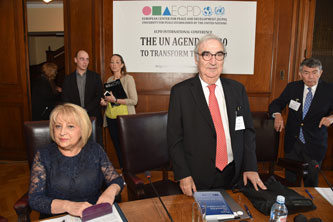 .
. 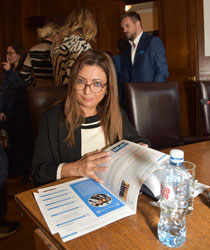 .
. 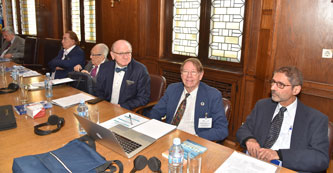
Dr. Ouidad Bouchamaoui of Tunisia, Vice-president of the ECPD Council and winner of the Nobel Peace Prize, underlined the critical challenges to all the world from conflicts and wars everywhere. We must cope with the consequences including migration with all its risks and suffering. There is a lack of vision in our leaders. We need to be optimistic and work together for one future for all of us. If we are to inspire future generations, who are our last hope, we need to bring together our actions and reflections to be more practical. The solutions are there, and if we combine all our efforts we can build a better future. Tunisia is now changing, and with free elections is on the right path. The need now is to motivate people, to provide more jobs and a better business environment, and to support the youth so that our dreams will become reality.
H.E. Professor Dr. Erhard Busek, former Vice-Chancellor of Austria and President of the Institute for the Danube Region and Central Europe, raised many questions about our present situation. The UN Agenda 2030 is to transform the world, or is the world transforming us? We are behind the reality of climate change and the environmental crisis, leaving a gap. Research has warned us for many years, but what has happened? What does ECPD stand for? Europe is no closer to a common Europe, with Brexit and the refusal of enlargement despite the efforts of North Macedonia. There are bigger problems in the Middle East, with 3.5 million refugees in Turkey, and Europe struggling faced with 250 migrants. We are not transforming the world. Only 20 countries qualify as true democracies, and the number is shrinking. What are the real results of all our meetings? We do not need think tanks but do tanks. Greta Thunberg has lead the youth, but will something happen? We need integrated solutions addressing many issues together, not going in different directions. We are raising borders, not putting them down. Politics is created out of conflicts, and the UN has become weaker, with consistent failure to reform the Security Council. We have new media, but have they helped us or spread hate speech? Education is still a national responsibility in Europe, and not devoted to real problems. We need a reality check, as everything is going faster and time is running out.
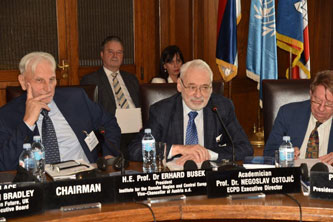 .
. 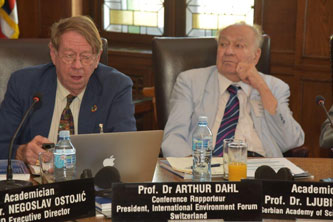 .
. 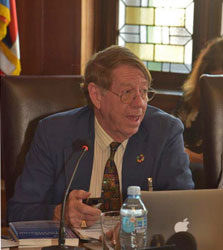
Professor Dr. Arthur Lyon Dahl, President of the International Environment Forum, asked where are we now with Agenda 2030? We are behind in reaching the goals by 2030. We have been warned for decades that continuing our present trajectory beyond planetary limits could bring about a major crisis in this century. Many governments, organizations and individuals are trying to implement Agenda 2030, but this would be ambitious even if everyone was cooperating. There is an “elephant in the room” in the form of the many forces working against the SDGs and multilateralism. Climate change has been driven by the fossil fuel industry, which knew already in 1965 the damage that its greenhouse gas emissions would do to the environment. They denied the science, spent billions blocking action on climate change, and plan for major increases in production in the decade ahead. It is no wonder that youth are striking and marching in the streets. For global sustainability we need global governance, and a recent project with two colleagues has prepared proposals for Global Governance and the Emergence of Global Institutions for the 21st Century to reform the United Nations. Humanity is gripped by a crisis of identity and needs to find a common human purpose in its unity in diversity. The pathway to sustainability will be one of empowerment, collaboration, learning and action revealing the human capacities for justice, reciprocity and happiness.
Academician Professor Dr. Ljubiša Rakić, President of the Board on Biomedical Investigation of the Serbian Academy of Sciences and Arts, asked how to transform the world? The ECPD could help in collaboration with other educational and cultural institutions engaging step by step to implement the goals. We must speed up now to transform civilization for the next millennium, studying the consequences and the changes in human beings as they adjust to the new civilization. An Inter-Academy Council for Southeast Europe has been established to help.
The economic challenges to Agenda 2030 are particularly acute. Everyone wants development, first to rise out of poverty and then to achieve a better life. Yet our economic and political systems focus on the short term, aiming to achieve immediate profits or to satisfy voters and win the next election. In doing this, it is too easy to go into debt, borrowing to keep growing, or living off capital rather that relying only on the interest. But at some point, debts have to be repaid, and once the capital is gone, so is the potential for interest. The result is bankruptcy and poverty. What is true in finance, is equally true for natural resource capital and social capital. Sustainable development means to maintain the productivity and wealth of our society within the limits of our resources into the distant future. No past civilization has done this successfully; all reached environmental or social limits and collapsed.
Agenda 2030 is ambitious, but it really defines what a successful society should achieve in the 21st century, and with modern technology this is possible. However, while the present economic system has generated great wealth, it has concentrated it at the top, leaving half the world population behind. What is lacking is the political will for change, linked to the powerful vested interests in the present economic and political systems that resist change. Despite the promise in this agenda, many countries seem to be sliding backwards if not disintegrating. The resulting stress is fragmenting societies everywhere. Now, with the rapid evolution of science and technology, humanity has run up against planetary limits from which there is no escape, and we have little time left to change course before catastrophic events from climate change and famine to mass migrations and wanton corruption, and the resulting political instability, become unbearable. A number of presentations addressed this issue.
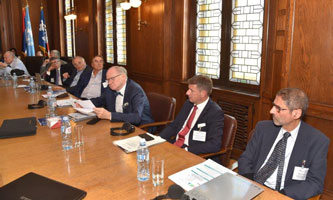 .
. 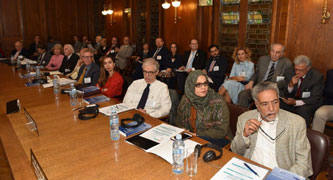 .
. 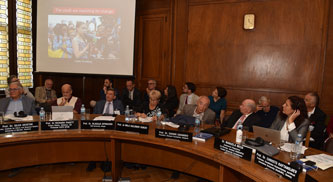
Academician Ljubisa Adamovic, Professor at ECPD, discussed sustainable development and the crisis of the global economic system, which is broken. In the United States unemployment is low and there is no inflation, but only a small part of the population is really benefiting and there is no cultural adjustment or redistribution, raising the question of the role of central banks and the government. Technological progress may help. Much of the world wonders what values to import, those of the Western system, or more local.
Professor Dr. Jožef Kunič, Honorary President, Slovenian Association for International Relations, reflected on the role of Slovenia in the Western Balkans. Slovenia made great efforts to join the European Union and the Euro zone, but the 2008 crisis imposed demands not in favor of the country. The European Union is losing its geopolitical importance. We do not need institutionalized groupings of states so much as informal groupings of countries with a common history like Scandinavia. The Balkan states should see future closer cooperation as a long-term solution.
Professor Dr. Tihomir Domazet, University of Zagreb, Croatia, provided an important perspective on the new economics needed for small open economies. He warned of the danger of globalization with neoliberalism, with four collisions facing the world economy: the USA-China dispute, the possible conflict between the USA and Iran, Brexit and its consequences for UK and EU, and the risk of failure in Argentina. The world is facing industrial slowdown, uncertainties in trade policy, low interest rates and higher debt. The global elites are playing with fire. The neoliberal ideology is disruptive for small open economies, with GDP per capita much lower in Croatia, Montenegro, North Macedonia and Serbia than 30 years ago. Will global debt, now at 3 times global GDP, lead to a huge crisis, to which small open economies, two thirds of world countries, would be particularly vulnerable? The collapse could come from failures of economics, markets and politics. Small open economies are subject to exogenous economic variables including business cycles, interest rates, investment, and as price takers. They are also subject to libertarian paternalism, manipulation and network power. Small economies need a new economics with common goals, a new growth theory and closer interactions. This system should recognize common goods as a new type of ownership, with new economics more socialist than capitalist, new public policy caring for the environment and climate change, and new business models focused on external interactions and ecosystem value, leading to a liberal and peaceful world.
Professor Dr. Marjan Svetličič, Professor Emeritus, University of Ljubljana, raised issues about the role of academics in the Sustainable Development Goals. They did not see the economic crisis coming in 2008, and are co-responsible for what is going on in the world today with unregulated markets and not enough attention to policy. Since they cannot address some big issues, they only focus on small issues, and have difficulty in escaping from old ideas. They need interdisciplinary approaches and “out of the box” thinking, leaving their ivory towers and improving their ability to communicate to their audiences.
Dr. Farhang Tahzib, Director of Public Health, West Sussex Primary Care Trust, UK, considered the core values needed for delivery of the Sustainable Development Goals. There are forces of disintegration and integration at work in the world today, requiring new values and ethics. Economic self-interest fails to motivate stakeholders to incorporate the social and environmental dimensions in their planning. We need to consider the ethical dimensions for delivery of the SDGs. Can we strive for prosperity while damaging the planet and harming people? Is it morally justified to change the climate with devastating consequences? There is no Plan B, because there is no planet B. What is our understanding of justice when most wealth goes to 1% of the population? Equity means social justice or fairness; it is an ethical concept, grounded in principles of distributive justice. Equity in health can be defined as the absence of socially unjust or unfair health disparities. Social injustice is still killing on a grand scale. Solidarity is an active concept, being willing to act on behalf of other persons derived from recognition of similarity with them, what people share in common and not what sets them apart. We need more solidarity and a global health ethic. Isolated national policies are no longer enough when the earth is but one country and mankind its citizens.
Professor Dr. Blagoje Spirkovski, FON University, Skopje, North Macedonia, described the challenges of economic democracy and democratic firms. The changing nature of our institutions raises questions about the rules of ownership of the means of production. Capital rents are more important than labor. We need to recognise the human right to ownership of the means of production in a legal democratic partnership.
The social dimension of sustainability also attracted considerable attention, since the Western Balkans have been particularly affected by everything from war and economic collapse to mass emigration.
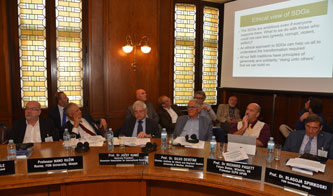 .
. 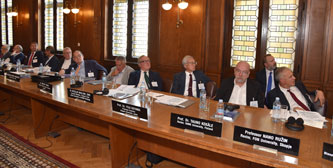 .
. 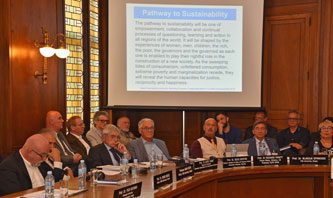
Professor Dr. Yoji Koyama, Niigata University, Japan, discussed the massive outflow of people from the EU periphery and Its depopulation, with its implications for European integration. Between 2000 and 2017, the population decreased in Lithuania (-19.1%), Latvia (-17.8%), Bulgaria (-13.4%) and Romania (-12.4%), mostly due to emigration to advanced EU member states. The driver was the big economic gap between post-socialist countries and the rest of the EU, with high unemployment after the collapse of the soviet economy. In Bulgaria, GDP per capita actually declined from 1989 to 2015. Continuing emigration has been driven by the expansion of income inequality within countries. In the Baltic states, the 2008 financial crisis caused a double-digit decline in GDP, severely affecting peoples‘ quality of life, so those countries gave priority to joining the Eurozone. The peripheral sending states lost highly qualified workers, while the premature imposition of austerity measures prevented them from adopting effective policies. EU investment in those states has largely been for infrastructure, failing to create sufficient jobs to stem the outflow of people. More attention is needed to the challenges of developing human capital in peripheral member states and to a more polycentric model of development.
Professor Dr. Boris Shmelev, Russian Academy for Sciences and Arts, Russian Federation, reviewed the problems of strengthening the stability of the post-soviet area. The rapid changes and complications in international relations created a new reality. An emerging new world economic order and the technological revolution gave the largest international corporations a competitive advantage in global markets. Inequality is growing, undermining the values of society. With rising economic nationalism, restrictions on trade are leading to trade wars and a renewal of aggressive relations, with a realpolitic framed by violence, strength and power. In this global context, the newly independent states with no long history face internal tensions, mistrust, suspicion and social explosions with a risk of interstate conflict, particularly with respect to the historical borders of Russian populations.
Professor Dr. Darko Tanasković, Former Ambassador of Serbia to UNESCO, explored Agenda 2030 and the New Humanism, responding to the search for values and concrete programmes with tangible results. He defined humanism as an attitude towards the world based on man and his destiny in relation to all things, responsible for his relationships, as opposed to instrumental nationalism. Its values are all through the 2030 Agenda, and even churches and religions can find themselves in its values. Meeting the goals is a condition for achieving the new humanism.
Dr. Richard Pagett, Future States, Wiltshire, United Kingdom, Professor ECPD, described the emergencies, dilemmas and decisions involved in global transformation. We are facing a climate, ecological and ocean emergency, yet the world is nowhere near achieving the reductions in greenhouse gas emissions required to prevent catastrophic climate change, with even the reductions committed under the Paris Agreement largely insufficient. Never before has the world faced transformation on such an unprecedented scale. We must reduce greenhouse gas emissions while bringing the poor out of poverty. We have degraded 60 percent of the world’s resources, yet a growing Chinese middle class of 600 million is demanding more, beyond the planet’s capacity. The dilemma is that countries must be reconfigured like never before, while meeting the needs of a population projected to reach 10.9 billion by 2100. We must rely on governments and global institutions to take decisions on a global scale. All human activities, from resource extraction and synthetic substances to economic activity need to be brought back within planet’s capacity, while biodiversity is protected and human skills, knowledge and health are developed with social progress, justice, and equity for future generations. We cannot manage this now, but not doing it could lead to extinction.
Prof. Dr. Mila Goldner Vukov, PhD, FRANZCP Cairns Integrated Mental Health and ATODS, Queensland, Australia, explored the meaning of war violence against women and children from individual, family and social perspectives. To change the world, we must start with the children, we must respect mothers, and Mother Earth. There were ancient civilizations without war, and a few countries have not experienced war for many years, but in most places the wheel of history repeats itself. Violence is a cultural, not an ethnic trait. In recent wars, 80 percent of victims were civilians, including many children. War is an expression of male dominance over women and children, often including sexual violence. Child abuse in war has affected 2 million children in the last 10 years. War results in dehumanization, degradation and despoliation.
The transformative change required by the climate crisis is an example of what is now required for many other sustainability targets. The climate is changing much faster that scientists had predicted, bringing the world close to tipping points where positive feedbacks could make it impossible to go backwards. The Intergovernmental Panel on Climate Change (IPCC) has now determined that we must limit global warming to 1.5°C to have a chance of avoiding irreversible and dangerous climate change. We have to do everything, and we have to do it immediately. This is not impossible, since we have the necessary technologies, but it will require unprecedented rates of transformation as net greenhouse gas emissions must be reduced to zero by mid-century. If everyone adopts a low-carbon lifestyle immediately, we can avoid overshooting the limit. Otherwise we shall need to use expensive carbon capture and storage and unproven carbon dioxide removal technologies to come back down to a safe level by 2100. Various presentations explored the implications of climate change and other environmental issues, both globally and in the region.
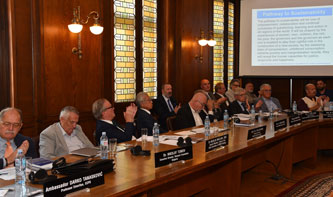 .
. 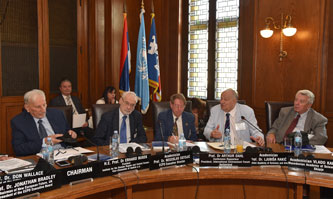 .
. 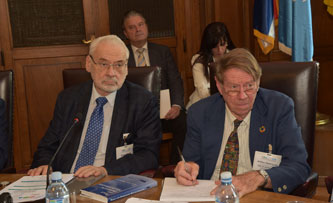
Professor Dr. Geoffrey Lipman, Creative Disruption Architect, described the SUNx Program on Climate Friendly Travel, addressing tomorrow's imperative today. He reviewed the existential risk that is climate change, saying our grandchildren will either freeze or fry. We must bend the curve of greenhouse gas emissions to carbon neutrality by 2050, thinking strategically and acting tactically. The climate crisis is volatile, extreme and disruptive, as illustrated by the recent destruction of the Bahamas. It is permanent and will get worse. Sunx is a climate friendly travel programme that is 2050-proof, aiming for 100,000 climate champions by 2030. A sustainable ambitions register has been established in Malta. We should plan for our kids, and do it, not just talk about it.
Dr. Nigel Carter, President En-Venture, UK, Senior Lecturer ECPD, reviewed the impact of climate change, desertification and land degradation in the Western Balkans region. There are particular threats to agriculture, which is already faced by land abandonment, poor economic returns, low yields on poor soils, the high cost of inputs, and capital costs, as well as urbanization and fragmentation. Climate change is bringing rising temperatures, decreasing rainfall and desertification, extreme events and loss of biodiversity and environmental integrity. It will be necessary to increase irrigation, reduce animal husbandry, and readjust crops towards more subtropical varieties. There will be water conflicts requiring improved water catchment and retention, aquifer management, controls on river extraction, and negotiations to share transboundary resources. The governments will need to help agriculture to make the necessary modifications.
Professor Dr. Georges Prévélakis, Université Paris 1 – Pantheon Sorbonne, Paris, France, shared lessons learnt from the Greek crisis as a case of unsustainable growth. There were benefits after joining the European Union in 1981, but ten years of suffering resulted from a mismanagement of relationships due to the misunderstanding of different cultures. In Greece, with its history as part of the Ottoman Empire with a logic of rents and rent-seeking, joining the EU meant free money. For the EU, it was investing to reduce differences and promote convergence. This was unsustainable and led to the 2004 collapse. Rent ruins the competitiveness of the economy, and when the rent stops, the economy is uncompetitive. It took ten years of austerity to restore Greek competitiveness. This shows the importance of understanding differences and being aware of misunderstandings.
Professor Dr. Merle Lefkoff, Founder and Executive Director, Center for Emergent Diplomacy, spoke on the SDGs, the Anthropocene, and paradigm shifts. She is an expert in the science of chaos and complexity. Just as Arthur Dahl had referred to the need for a paradigm shift in the United Nations, we cannot continue diplomatic processes as in the past. The global banking system, like traffic jams in Beijing, is out of control. The violent reactions against migrants, and the closing of borders affecting mostly women and children, even the difficulties in Sweden integrating migrants, show that we do not know what to do about it. The declaration of the Anthropocene shows the global scale of human impact. In a doomsday scenario, we cannot stop our use of fossil fuels to reach zero emissions and will face collapse. To promote prosperity by protecting the planet, our concept of prosperity has to change. The national security apparatus in the USA considers climate change as a threat multiplier. Even the Paris Climate Change Conference (COP21) was mostly men. We need to follow the example of the indigenous peoples and become Earth-centered, looking to nature for guidance. What would nature do? Where is the adjacent possible?
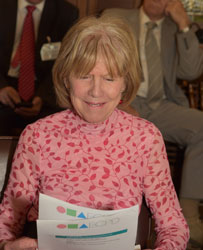 .
. Professor Dr. Christo Kaftandjiev, Kazakhstan Humanitarian Juridical Innovative University (KazHJIU), explored making cities inclusive, safe and sustainable using the Creative Intertextual Communicative Approach. He noted the importance of cultural values and efficient communications, when life imitates art.
Professor Dr. Boris Cizelj, DOBA Business School, Alma Mater Europaea, Maribor, President KEN, discussed how to reach sustainable development through an improved innovation ecosystem. Sustainable development is undermined by socio-economic differentiation at all levels, with major disparities in more than half of countries. The United States has seen unsustainable wealth concentration since the 1970s, with the top 10% of the population holding 78% of the wealth. The negative implications of disparities are now recognized as destroying demand and creating political instability, as well as being morally unacceptable. In the post-industrial era, knowledge economies sustain economic and social progress, and the pace of innovation is accelerating. They change from a linear to an open innovation system. Such economies require education and training to build human capital, science and research to develop new knowledge, innovation to develop new products and services and bring them to market, and entrepreneurship implementing personal initiatives through market acceptance. The average age of companies is important, with 18% of young companies in the European Union versus 54% in the USA. In the Global Innovation Index, Switzerland, Sweden, USA and the Netherlands come out on top, showing the importance of human capital over physical capital stocks. An innovation ecosystem covers the totality of traditions and values, legislation, strategies, innovation actors, government institutions, policy instruments, modus operandi and patterns of interaction – with particular reference to education, R&D, innovation, and entrepreneurship.
Professor Dr. Miodrag Vuković, Chair, Committee on International Relations, Parliament of Montenegro, described the success of Montenegro as an Ecological State, declared in its constitution in 1991. After 28 years, they are maintaining the pace with a state policy for sustainable development. The whole population is convinced of the effort necessary to enter the European Union. There is an innovative framework for ecosystems, with a long tradition going back to 1868 when the king set aside a rainforest preserve. Now 30% of the country is in protected areas, with 5 national parks, 40 protected areas, 15% of the coastal area mapped, and a Natura 2000 framework is in place. 70 laws have been harmonized, with 300 acts and15 strategies meeting international and EU standards. There was great disappointment at the recent EU Council decision to postpone or halt integration. Today the whole world is addressing environmental protection, and the urgency of responding to the climate crisis is a new EU priority.
Since peace and development are a central focus of ECPD, and the Western Balkans are in the midst of challenges concerning their integration into the European Union, it was appropriate that many papers addressed issues of institutional arrangements and partnerships in the last two SDGs.
Academician Professor Dr. Vlado Kambovski, Macedonian Academy of Sciences and Arts, Skopje, discussed the rule of law as a fundamental Sustainable Development Goal and the challenge this represents for the Balkan Countries. There was surprise at the EU delay in entry negotiations despite all their conditions being met. The reason given was the need to rethink the negotiating process, and in particular the establishment of the rule of law. The result is a vicious circle of the poor rule of law. States are continually undermined by political and ideological disputes, with capture of the state, a lack of democracy, and mass manipulation of citizens. There should be monitoring during the negotiation process to get out of this vicious circle. The rule of law is the main challenge in the western Balkans, with a struggle for human rights and justice. The people of the western Balkans need preparation for the Sustainable Development Goals, and the best way to do this would be to open negotiations without delay for all Balkan countries.
Professor Dr. Horst Mahr, Chairman, Foreign Affairs Association, Munich, Germany, warned about the new world disorder and the urgent need for leadership. After seven decades of the European Union and global institution building, President Trump has cynically and actively destroyed the Pax Americana. After the aristocracy to the end of the 19th century, and then the products of elite schools, today there is no real elite left. Now the topic is immigrants. Germany invited migrants to Europe in 2015 at a cost of 6 billion Euros. Now Turkey is threatening to send over 3.5 million more. The traditional parties are unable to solve these problems, leading to the rise of populism on the right.
Professor Dr. Manuela Mesa, Director, Center for Education and Research for Peace, Culture for Peace Foundation, Madrid, addressed the challenges and opportunities to implement SDG 16: Promoting Peaceful and Inclusive Societies. She noted the importance of this goal for all the other goals, calling for good governance, participation and the fight against corruption. Conflict and violence are a major development challenge. A comprehensive global audit of all SDG16 indicators will be important for all countries. There are two main challenges: peace and its conceptualization faced with present violence, and security, which is a main factor for peace. It is necessary to solve disagreements without violence through constructive dialogue and conflict resolution, requiring institutions, structures and positive attitudes. Another problem is the ability to collect data for these indicators. An effort is needed to progress on this, with the help of academia and think tanks. Governments often forget this in reporting to the UN.
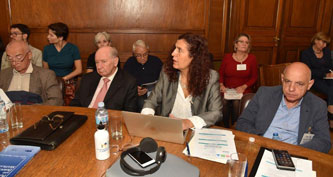 .
. Dr. Roberto Savio, Director of ECPD International Relations, addressed the crisis of multilateralism in the face of rising xenophobia, nationalism and populism. During the Cold War, UN action was often blocked by the ideological conflict of US capitalism versus USSR communism. After the fall of the USSR, Reagan and Thatcher agreed to a new US-driven hegemony around the Washington Consensus that markets would solve all problems and everything that did not produce money was not useful. After 20 years of the market system leading to the financial crisis of 2008, the people left out of globalization have been rising up and moving, creating a fear of immigrants, while wealth concentration at the top continues to increase and countries are blowing up. If we look to our future, it cannot be a function of what we have now, with each country trying to be first. We need a totally different capitalism. All countries must work through the multilateral system of cooperation to keep the peace.
Professor Dr. Nano Ružin, Rector, FON University, Macedonia, discussed the French-German partnership and its impact on the enlargement of the EU in the Western Balkans. Over the years, the relationship between France and Germany has been unpredictable, coming closer from 1963. More recently over Brexit, France wants a rapid departure and a strengthening of its role in Europe, while Germany worries about losing a market for its exports and a counterbalance to France in the EU. There are differences over EU integration. With respect to the enlargement of the EU in the Western Balkans, their view of the region is negative, with symptoms of captured state, organized crime and corruption, as well as the absence of the rule of law. Serbia and Montenegro have begun negotiations, and the EU Council decided in 2018 to open negotiations with North Macedonia and Albania in 2019, but President Macron, concerned that enlargement could threaten functions of the EU, is now insisting that the EU be reformed before any enlargement. This threatens to increase the influence of external actors in the region, and amounts to changing the rules during the match. North Macedonia and Albania may be collateral victims in the dispute between big countries of the EU.
Professor Dr. Silvo Devetak, University of Maribor, Slovenia, called for reconciliation of values and development patterns as a prerequisite for integration of the Western Balkans into the EU. The EU needs a new structure with fresh policies, an updated action plan and financial resources. It needs to be flexible in its regional cooperation, combining common criteria with respect for the traditions of each country. The EU legislative process needs revision, not just with political elites but with local communities, chambers of commerce, educational institutions, etc. For stability, there should be more cooperation with the UN, the World Bank and the IMF. NATO is concerned with the common interests of Europe and the USA, not the interests of the EU. There is a need to ensure step-by-step integration of the Western Balkans into European values, with support to conciliation processes.
Professor Dr. Zahari Zahariev, President, Slavyani Foundation, Bulgaria, reviewed the global challenges facing Agenda 2030 and the need for a social revolution. Climate change will be driving mass migration. Citizens see increasing inequality. The world sees a rapid increase in services, not production. With technological innovation, robots will produce most goods, increasing unemployment rather than providing services to human beings, feeding populism and conflict. The moral imperative for social justice requires a new social contract. The 2030 Agenda provides good targets, but these are a dream. We must work for change today.
Professor Dr. Nikolai Tomov, Director, Slavyani Foundation, Bulgaria, described a specific Chinese vision for Agenda 2030 as a collective vision leaving no one behind. What was the place of China, with what foreign policy and vision of the future? There is a great revival of Chinese action centered around the Belt and Road initiative.
Professor Dr. Boško Bojović, School of Higher Education for Social Sciences, Paris, France, raised questions about the West and terrorism. While the United Nations has build partnerships for peace and development, it has not found any accepted definition for terrorism, Without such harmonization, the human rights of millions can be affected. Countries define terrorism in totally different way, as for example the way the USA and Turkey treat the Kurds.
Professor Dr. Vern Redekop, Saint Paul University, Ottawa, Canada, explored the role of public-spirited leadership and administrative blessing in achieving the UN 2030 Goals. Among the factors that help some systems to work well, leadership that is motivated by the public good, justice, inclusiveness, creativity, the environment or transcendence is more effective than that centered on ego, violence, ethnonational groups or the interests of billionaires. Such public-spirited leadership can empower other leaders and young people. Spirit refers to something intangible yet real, reflecting values and orientation and manifested in behavior, allowing for deep connections between people. Publics are ever more inclusive and complex up to the level of the universe. An ethical vision can support the Sustainable Development Goals, cut corruption and foster freedom, making it possible to admit mistakes. ECPD could help to define public-spirited leadership, find examples, assess leaders and perhaps give an annual award. Administrators always have a certain level of discretion when they make decisions that affect the lives of people. Administrative violence occurs when discretionary powers are used to diminish, harm, or negatively affect people, particularly those belonging to particular groups, by choosing the most extreme option or imposing unreasonable technicalities. The opposite, administrative blessing, uses discretion to advance the goals of human well-being for all. ECPD should encourage administrators to advance the SDGs and share good examples.
Academician Professor Dr. Paskal Milo, Albanian Academy of Sciences and Arts, Tirana, described some of the challenges in Albania’s path towards achieving the UN Agenda 2030. He noted the gap between declarations and realities, asking how can we realize all those SDG projects? There is no unity at the global level, with rising isolationism in the USA and UK, while Russia and China have different visions and projects. He asked who are the decision-makers, and are they conscious of the problem? The perception is that even the EU is going down hill.
Professor Jovan Manasijevski, Former Minister of Defence of Macedonia, provided a reassessment of the security-development nexus with respect to the UN Sustainable Development Goals and human security. He noted the absence of security as a focus in the SDGs, the closest reference being to preventing violence in SDG 16. There are two faces of security, supply and demand. On the supply side, security is a process of political and social ordering maintained through authoritative discourses and practices of power within a territory. It stabilises existing distributions of power and prosperity, with a tendency to inequality, including unequal security. Both states and the international community have a ‘responsibility to protect’. On the demand side, security is an entitlement of citizens and more widely human beings to protection from violence, abuses of rights and social injustice, along with other existential risks. It is linked to freedom from hunger and disease, protection from environmental hazards, etc. It is tied to the construction of identities and of imagined communities. Rights, legitimacy and consent are central; the state is the problem as much as the solution. There is a demand to transform conditions creating insecurity, including bad governance and social exclusion. Security has been mainstreamed in development, as they are linked even if the relationship is unclear. The World Bank and UNDP speak of securitisation of development, with an effort to rebuild security and justice institutions for peace-building, but this is riddled with contradictions, and can lead to defending the security interests of global powers and local elites. Among the consequences are an unenforceable responsibility to protect, and double standards for human rights, with a risk of degeneration into poverty relief and riot control. Collective action is essential to minimise the insecurities facing all humankind in a world of rapid and interdependent changes, despite market forces and national interests that erode existing structures of international collaboration, state regulation and democratic accountability. The challenge is to create more democratic and inclusive societies in which people can claim greater control of their security - in a world in which the forces of power and profit continue to be stacked against them. There is still a long road to the desecuritization of development.
Danny Briottet, Project Manager, Music Producer & Broadcaster, London, UK, approached the UN 2030 Agenda from a UK urban perspective. While Goal 11 includes respect for cultural diversity, this is far from the case in the United Kingdom. There are murders every day in London, with 43,516 knife attacks last year. With government funding cuts to police forces, there is no prosecution. There is gunfire at night with gang wars between postcodes, and children coerced into working for gangs. Millions live in poverty in the UK, including many children, with a rise in populism. Brexit has been hijacked for other ends, such as a withdrawal from human rights and social cohesion, and abolishing development aid, replaced by rampant consumerism, a zero-sum mindset and increasing polarization.
Dr. Nicholas McLean, CMG, Council Member, Federal Trust for Education and Science, Chief Executive, MWM, UK, raised similar questions about the United Kingdom, and whether it was a reliable partner for global transformation. The debate over Brexit has seen millions marching in the streets. With a no-deal Brexit the worst of all possible options, another extension is likely. In these circumstances, will Britain be a reliable partner? Can it be trusted? The British are an island people, looking outward from their castle with a moat. Isolationism is strong. They cannot seem to get along with their closest neighbors, and have concluded few trade agreements. Yet anti-European language is largely rejected by the British people, and fundamental values are upheld, including by Conservative MPs and Lords. Most young people are in favor of remain. The main leave campaigners have been fined for electoral fraud. The British people need patience and understanding, in the hope that they will resume engagement.
The discussion raised a number of interesting and relevant issues. We tend to look at the symptoms and do not diagnose the fundamental diseases. We are experiencing processes of disintegration and integration, the latter uniting the world in implementing the SDGs. We hope that public opinion will come on board, but that will require metaphors, stories and the arts to communicate at another more emotional level. The difficulty in dealing with approaching danger is to recognize that we are responsible, but that may only occur when we are in imminent danger, by which time it may be (almost?) too late. We have managed to avoid a nuclear holocaust for 80 years, by somehow drawing back at the last minute. How can we last for another 80 years? The problems we are facing are completely beyond our capacity to solve, unless we act collectively with a spirit of reconciliation and cooperation. There is a challenge in how to globalize the things we want to globalize without an effective global governance. The UN could be reformed, but it will require significant funding.
On the leadership role of Russia, its influence has been growing due to its strong military/party structure. It has been present in Syria since 1952, or could not have been so influential now. The nuclear agreement with Iran was largely prepared by Russia, and Iran is being careful not to provoke action. The nuclear danger may be bigger than the climate danger, both from a direct confrontation between the US and Russia, and from other nuclear states like Pakistan. Turkey is full of internal contradictions, and with its ideological basis weakening, it is returning to old risks of instability. A weak Turkey will impact the Balkans.
Nowhere in the world is on track to achieving all the SDGs by 2030. Many trends are still in the wrong direction, and for some such as eliminating hunger we are falling back after a period of improvement. If we want to transform the world, we must raise the level of ambition. Everyone must be involved in the effort that is necessary, requiring widespread public information about the 2030 Agenda and the SDGs through educational programmes in the schools and places of worship, in the media and in political discourses. The effort should be like going on a war footing, with all efforts focussed on the objectives. The challenge is too important to become the subject of partisan political wrangling. Everyone should unite against the common enemy, our own unsustainability. We have waited too long, and ignored too many warnings, to delay action any longer.
This ECPD conference with its series of outstanding papers raised many significant issues and stimulated wide discussion of both the global situation and the specific challenges facing the Western Balkans. The ECPD should try to communicate the results widely to increase their impact. They can contribute to the global transformation necessary to implement the Sustainable Development Goals.
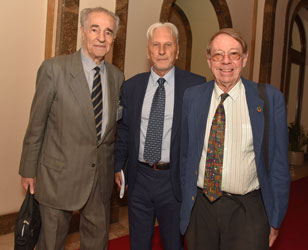 .
. Belgrade, October 2019
(Belgrade City Hall, 26 - 27 October 2019)
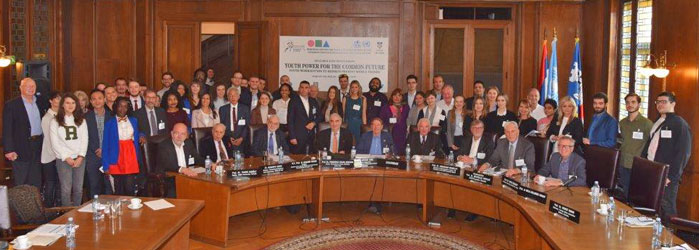
The 7th Global ECPD Youth Forum assembled 86 participants from 30 countries at the City Hall in Belgrade, Serbia, on 26-27 October 2019 for a rich exchange on issues of particular concern to youth. The theme of “Youth Power for the Common Future: Youth Mobilization to Redress Present World Trends” used the Sustainable Development Goals (SDGs) as a framework for finding solutions to unsustainable world trends and existential risks like the climate crisis. After a day and a half of exchanges and intense discussions, the participants left with a new motivation to work positively for the fundamental transformation in society called for in the UN Agenda 2030 and required to respond to the pressing global risks threatening their future.
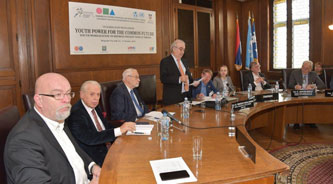 .
. 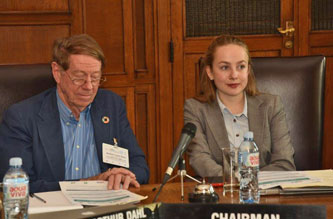 .
. 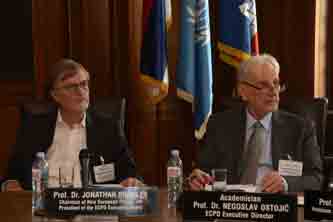
Prof. Dr. Federico Mayor (President of the ECPD Council) (video link). In his opening video presentation, Federico Mayor described the continuing need for peace after the first and second World Wars. President Roosevelt hoped for no more war based on supremacy, guided by human rights. Today billions are spent on arms while children are dying. The UN Charter begins “We the peoples...” and was intended to save succeeding generations from the scourge of war. Now that technology has given us knowledge and a voice, silence is not allowed. We must say no to those starting a new arms race. There was a movement of hope in 2015 with the adoption of Agenda 2030 and the Sustainable Development Goals (SDGs), as well as the Paris Agreement on Climate Change. The youth know that there is no Planet B and have launched a great mobilization, with no discrimination between men and women.
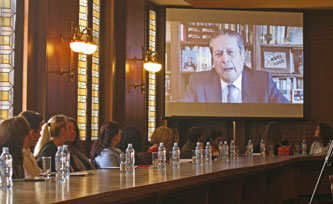 .
. 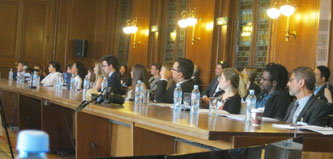 .
. 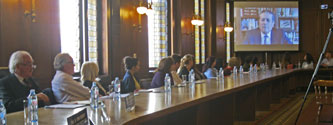
Prof. Dr. Francisco Rojas (Rector of University for Peace est. by the United Nations). The Rector of the University for Peace, Francisco Rojas, referred to SDG 16 and said that peace was necessary to express any rights. There was war in the Balkans 20 years ago. Now you can create a new country, a new Europe, a new world. Humanity is failing to protect this tiny planet in space, threatened by climate change and loss of biodiversity. There is a growing threat of nuclear war and other wars, and militarization of the migration conflict. The 2019 Global Peace Index lists the most and least peaceful countries. Interstate conflict is down, but internal conflict is increasing. The Middle East is most threatening, giving rise to terrorism and more crises. The principal causes are poverty and inequity; extreme poverty has reduced but there are still numerous poor. Corruption is a new threat in all parts of the world, affecting the public sector, politicians and even religious leaders. Homicides are up in many cities like Los Angeles and across Latin America, especially Brazil, Mexico and Venezuela. Global organized crime is driven by drugs, human trafficking and environmental crime. Prevention is most important, as lack of prevention increases conflict. We need new paradigms for rule of law, based on knowledge and going to the roots of these problems.
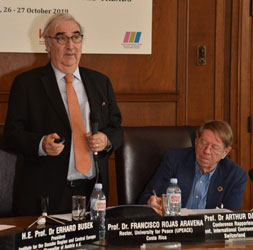 .
. 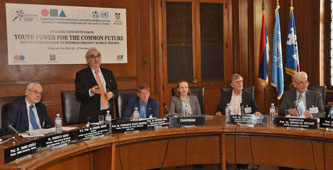 .
. 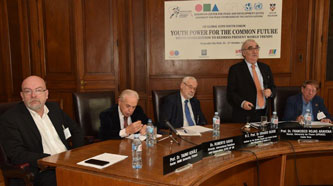
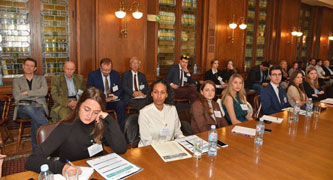 .
. 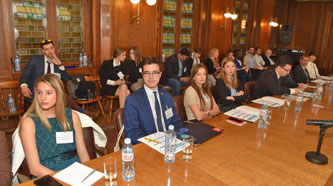 .
. 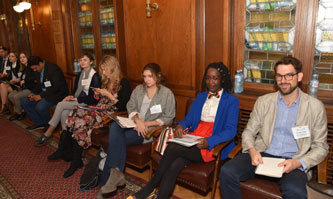
Prof. Dr. Erhard Busek (Vice-Chancellor of Austria a.d., President of the Institute for the Danube Region and Central Europe). Drawing on his long experience, as he was born during World War II in a city that was bombed, Erhard Busek told the youth: you are inheriting new problems. Will there ever be peace? We are at a critical point, with new kinds of wars including cyberwars, but you have the capacity to handle it. What does sustainability really mean, and how to reach it? The next generation will ask you if you achieved it, so you must take responsibility. We are closer to solutions on food and meeting basic needs. The challenges are coming with globalization, as depending on each other is not so easy. There are more refugees than after World War II with no solutions. We have new instruments of communications, but do we use them for democracy or for hate speech? You are challenged by interdependence, as democracy is crumbling, with only 20 real democracies left. The Security Council is paralyzed with no common solutions, and everyone looking out for themselves. We need common solutions, so you should raise your voices and contribute to creating solutions. Talk about the real problems and real results. Develop change models and new forms of cooperation. Gorbachev talked about the common house of Europe. Today the world is one house, and you should look forward to the future.
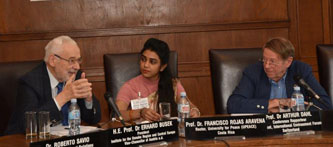 .
. 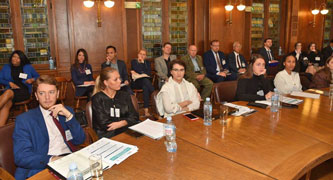 .
. 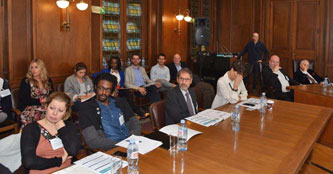 .
.
Prof. Dr. Tauno Kekäle (Co-Organizer, Rector, VAMK University, Finland, ECPD International Center for Integrative Medicine). The co-organizer of the Youth Forum, Tauno Kekäle, referred briefly to the importance of values, trust, networking and communications, building new models of prosperity.
Prof. Dr. Arthur Lyon Dahl (Chair of the 7th Global ECPD Youth Forum). The chair of the Youth Forum, Arthur Dahl, emphasized the importance of unity in diversity as a foundational value, quoting from the international governing body of the Bahá’í Faith:
“Consider how radically different... a fragmented conception of human identity is from the one that follows from a recognition of the oneness of humanity. In this perspective, the diversity that characterizes the human family, far from contradicting its oneness, endows it with richness. Unity... contains the essential concept of diversity, distinguishing it from uniformity. It is through love for all people, and by subordinating lesser loyalties to the best interests of humankind, that the unity of the world can be realized and the infinite expressions of human diversity find their highest fulfilment.” He concluded that “the pathway to sustainability will be one of empowerment, collaboration and continual processes of questioning, learning and action in all regions of the world.... As the sweeping tides of consumerism, unfettered consumption, extreme poverty and marginalization recede, they will reveal the human capacities for justice, reciprocity and happiness.”
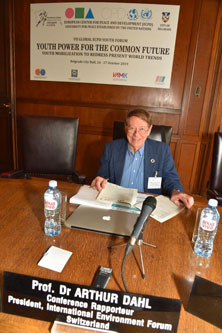 .
. 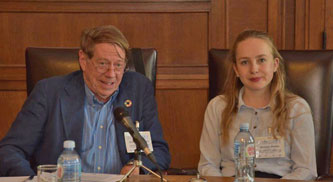 .
.
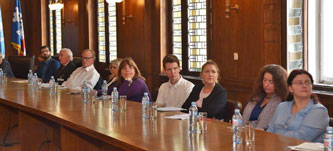 .
. 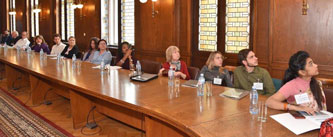 .
. 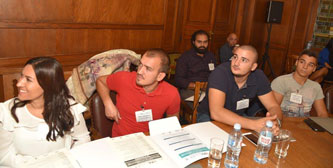
The first session was to help the youth get inspired by the experience and knowledge of several speakers. It asked what world youth wanted to build? The Sustainable Development Goals provide an overarching framework, with a strategic goal to leave no one behind. But there is often no discussion of fundamental values and motivation. The ECPD Conference yesterday often reflected pessimism about the future, as the present generation has largely failed for lack of values, and cannot give advice. You are the last hope in the growing culture of scepticism and greed. You need to mobilize for the SDGs, as you are the only ones who can say where we are going. The example of putting men on the moon showed what could be done with concentrated effort. You need creativity as you look for the adjacent possible beyond the usual.
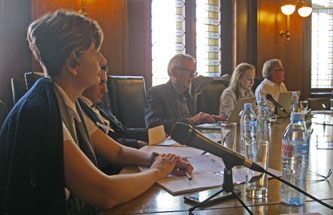 .
. 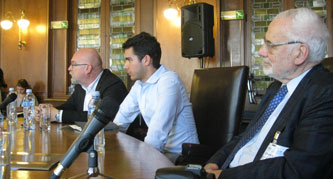 .
. 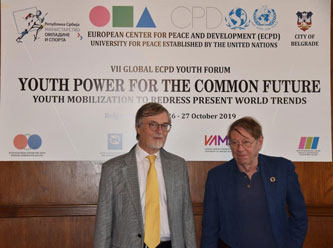
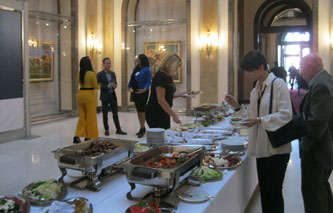 .
. 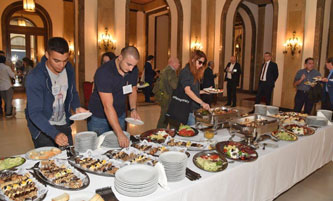 .
. 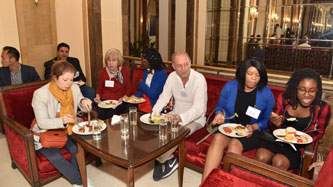
Lunch
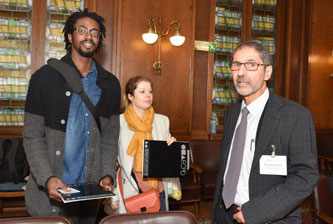 .
. 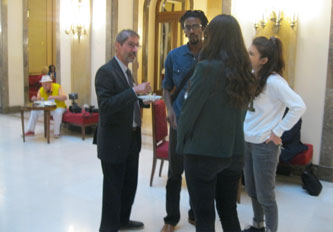 .
. 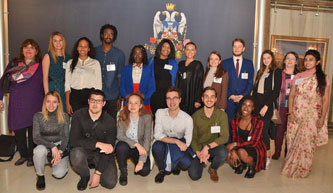
The remainder of the first day was devoted to presentations mostly by young people on the variety of topics of special interest to youth and largely moderated by youth.
For the economy (SDGs 7,8,9,12,16,17), Daily Atieno Omondi, (Internationale Jugendgemeinschaftsdienste (IJGD), Berlin, Germany) talked about the challenge of being qualified and unemployable, which can happen if you are not planning for what is coming ahead. She advised to choose role models you can relate to, create networks and build experience, recognizing that you need to start at the bottom and work your way to the top. This requires a strong mindset, thinking positively, acknowledging that failing is normal, but you should never stop trying. Aleksandra Manasijević and Aleksandar Božović (Magic Lamp Association Vergara) related acting, the economy and war, with particular reference to the role of theatre and the film industry, which needs greater thematic freedom. War builds budget deficits and a war economy with resources devoted to arms, as in the Third Reich, the Yugoslav wars and Bosniacs and Serbs.
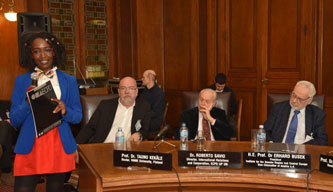 .
. For the environment (SDGs 6,7,12,13,14,15), Divya Sree Muppichetty, (International Relations, Social Entrepreneur, CEO of MEDICONEED, India) described the advantages of green schools and ecological schools where students can learn the advantages of farming and being close to nature. Venneisha Myers (Student Union Economics Faculty (SUEF), University of Belgrade, Serbia), gave an example of the impact of climate change in the Caribbean and the position of the youth in finding solutions. She described hurricane impacts in Jamaica destroying agriculture, and a young entrepreneur who developed eco-friendly farming using hydroponics to allow higher production in a small space, preserving soil. Merle Lefkoff, (Founder and Executive Director of Center for Emergent Diplomacy, Santa Fe, USA, and one of the few non-youth) warned about the vulnerability of our complex civilization, with climate change and species extinctions bringing such rapid change that we cannot keep living as we are now. Imagine if there is no electricity because there is not enough, so no Internet, no water. We must learn to grow and store food, working with indigenous elders who still know how to survive with little. It might in fact be a much better life as a small-scale farmer. Dana Rodriguez (Master student, Politics and Public Administration, University of Konstanz, Germany) then led a discussion on a Green Economy. To adapt to climate change with economic development, farming will need to become more important in daily life. We need to incorporate the economy into nature, with more rural connectivity, and also connecting with bigger markets.
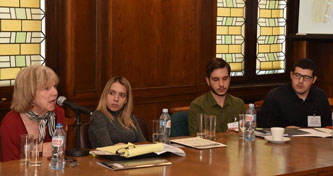 .
. A variety of papers touched on the social dimension of sustainability (SDGs 1,2,3,4,5,7,10,11,12,16). Prof. Mila Goldener Vukov, (The Royal Australian & New Zealand College of Psychiatrists, Australia) presented change as an opportunity. We all need to change, and with the help of positive psychology this should become our reality, building integrity in our family and at home. Dragana Koštica, (MA Cultural Policy & Management, Editor in Chief, Still in Belgrade Magazine, Serbia) considered squatting, occupying unoccupied land or buildings, as expressing the right to the city. It can be driven by deprivation, as alternative housing, for entrepreneurial reasons or as a political statement. A UK Urban Perspective was provided by Danny Briottet (Music Producer & Broadcaster, London, UK) who shared details on violence in London due to budget cuts in police and social services. Ana Krmar, (PhD Candidate, Research Fellow ECPD UN, Belgrade, Serbia), raised the importance of integrity and perseverance of young people as values to battle the superficiality reinforced by current trends, showing how values and knowledge are interrelated.
Simona Aleksovska (Consultant, EVROSIMOVSKI Consulting, Skopje, North Macedonia) and Vladimir Petkovski (Assistant Professor in Institute Economics, Skopje, North Macedonia) described the psychological and social effects of mass media marketing on young people. In a world where 2.5 billion people struggle to survive on less that $1.50 per day, while 29 people have the same wealth as the lower half of humanity, the mass media give no priority to the malfunctions of society. Everyone should try for modernity, achievement and success, with growth as the supreme value. Social feedback aims to create a feeling of belonging. Happiness shared on line is contagious and shows what we should try for. The result is a reality gap, between objective, subjective and inter-subjective realities. Milena Peralović, (Deutsche Gesellschaft für Internationale Zusammenarbeit (GIZ) GmbH, Serbia) discussed localization of the Agenda 2030 and the Sustainable Development Goals by reforming the academic community. Hannah Wahler (BA student Social Sciences with a focus on intercultural relations, University of Applied Sciences Fulda, Germany) provided a picture of Serbian youth and the 2030 Agenda with its Sustainable Development Goals (SDGs) in network. Serbia has a national program for the SDGs, but it is mostly talk and little action (for example in recycling rubbish). Serbian youth have power that should be implemented, but they lack trust in the UN and also in the SDGs. There is a need for a youth strategy for the SDGs. Nature´s Common Third Model was presented by Melina Zia (School of Philosophy and Education, Thessaloniki, Greece). The garden of inclusion was created to encourage interaction between locals and refugees. The NGO Athirma provides motivation and cognitive support for negotiated identities in which everyone finds their place.
Nicolas Maclean (CMG, Chief Executive, Federal Trust for Education and Science, UK) explored the key role of youth in the maelstrom of British politics. Scotland gave youth the vote at age 16, but this was refused in England by Brexiters as it would have reversed the result of the referendum. Young people were shocked and traumatized by the vote to leave the EU. The parties for Brexit were fined for fraudulent campaigning, and they have accused remainers of projecting fear. On 19 October over 1 million marched in London, and young people are joining anti-Brexit parties in preparation for the election on 12 December, where they may swing a marginal difference. Marco Boccaletti (BA student of Russian and Spanish Philology, University of Verona, Italy) compared the importance of Green parties in Serbia and Italy. The Green Party is low in Italy with no representation in parliament. In Serbia, there is low awareness of the Green Parry as people who hug trees. Priority is given to other “bread and butter” issues like salaries, pensions and migrants. However, an alliance with the socialists gave them two seats in parliament.
Guglielmo Rezza, (Red Cross and Red Crescent Partnership on Substance Abuse in Villa Maraini Foundation, MA in international Relations) described youth engagement for a humanitarian drug policy. The world has 275 million drug users aged 15-65, and each year 45,000 die from drug overuse, 76% youth. Drug trafficking is continuing despite repression, so we must address demand. A criminalized war against addicts does not work. Since drug use is a reality and cannot be eliminated, the best is a harm reduction approach, not stigmatizing or marginalizing, but reducing the impact on the health of the user. To avoid HIV transmission, the rules in order of priority are: don’t start, take treatment, don’t inject, use sterile equipment, disinfect with bleach. Access to treatment is needed including in jail and in neighborhoods, with distribution of clean needles. Youth leadership and commitment is required, promoted in the Red Cross and by public authorities. An example of a youth in direct contact with the reality on the ground was Rebecca Meyer (MBA Student Peace and Conflict Studies, Marburg, Germany), who described her work in Cambodia studying the influence of history education on national identity in post-conflict contexts. During the Khmer Rouge regime in 1975-1979, 1.5 million people were killed, leaving the median age today at 24.9 years. The issue is highly political and sensitive, with many Khmer Rouge still in government, illustrated in selective memory in a social reference framework for identity formation. Non-formal education can serve as a catalyst for peace-building. Tara Ropret (Representative of Serbia in Karate, Karate Club NIPPON, Psychology student, Faculty of Philosophy, Belgrade) and Tatjana Petrović (Member of the Olympic Committee of Serbia, President, Karate Club NIPPON, Belgrade, Serbia) described sport as a platform for youth cooperation worldwide. Karate emphasizes cultural and moral values of respect and learning from mistakes. It is a sport where one travels a lot, building friendships and connections, and learning to communicate. It is also important for the promotion of women in sport.
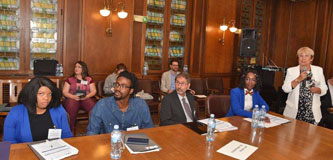 .
. Irena Dubak (Senior Business Manager, OTP Bank Serbia, founder of civil society organizations “Live healthier”, “House of Achievements”) explored the influence of technology on youth power for the common future. She noted that technology has become a way of life, with advantages and dysfunctions. It is important to keep a balance of spiritual, intellectual, emotional and psychosocial life. There is presently no systematic prevention of technology addiction, which starts with children. Studies show that young people who do not play outdoors are not able to plan better options for their future life. A 30-minute walk can stimulate the brain and increase awareness. Maria D‘Oultremont Tantiñá (Journalist, Blanquerna Observatory on Media, Religion and Culture, Ramon Llull University, Barcelona, Spain) explored art and creativity as tools for change through media for dialogue, using as examples the video Refugee Village where they all hate the word “refugee”, and #BeTheKey. A mural had the theme “hope makes the future”. The boxing squatters were empowered and changed their vision. In a maternity, victims of rape had a baby that was not wanted. Another first-hand experience was shared by Libyan Mohamed Alyatem (Senior associate, Arabic Cultural Centre, Belgrade, Serbia) who discussed the role of youth in post-conflict states to achieve peace. The view was more negative than positive. Youth oppose authorities and politicians with a PhD in hypocrisy. They are drawn into Muslim groups by ideology or a vision with a need for youth integration. In Libya, 40% are under 15 years old and only 13% over 40. Youth turn to crime and violence and reject politics. They are used as pawns in political games, hoping to win and get privileges. In the final paper, Thomas Hilker (Program & Fundraising Manager, For Peace Initiative, Berlin, Germany) noted that we have failed in peace and sustainability at so many levels. We have a responsibility to prevent, but where does peace start? How do we co-create it? We need to change structures, interactions and mindsets. The German constitution is committed to peace, but €43 billion is spent on defense. The For Peace Initiative calls for a Ministry of Peace, inclusive with women and youth, with funding for peace building and peace education involving civil society. It develops the concept of positive peace, not just the absence of war, connected with the environmental movement. They are planning a summit on an alliance for peace-building with Costa Rica.
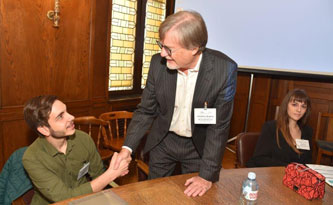 .
. 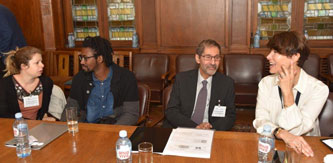 .
. 
The day ended with a workshop on the Dialogue process led by Marco Boccaletti, Merle Lefkoff and Vern Redekop. The principles of dialogue include becoming aware of what is happening inside of you, especially strong feelings, being respectful of time and giving everyone time to speak. It is important to be able to listen, not interrupting and giving everyone equal time. Dialogue can be used in real negotiation processes, building trust so that the truth can come out. In thinking creatively together, try to build on each other’s contributions and come up with shared action areas.
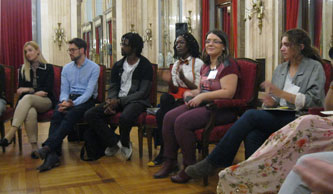 .
. 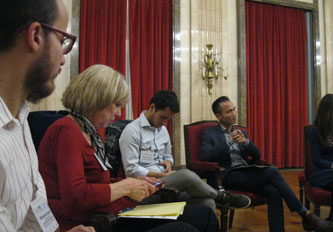 .
. 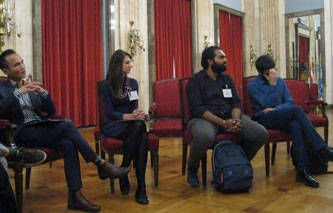
A second workshop was on Fake news and improvement of organizational communication practices, moderated by Prof. Dr. Velimir Dedić. He described fake news as an oxymoron or contradiction in terms. After exploring many dimensions of communications, he suggested requirements for good communications: from whom, to whom, in what context, time and place, with adequate reference frames and an agreed context. Fake news involves denial, privacy breach or repudiation, with a foreign, obsolete or inadequate reference frame, and a default context fallacy. It plays on human ignorance and aims to achieve an unethical goal. It is important to be honest and sincere in communications and not to play games.
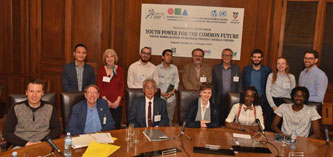
The Wrap-up Session on Sunday 27 October was moderated by the Chair of the Youth Forum, Arthur Lyon Dahl. He invited all the participants to suggest the topics they wanted to discuss. These were combined into six common themes, and everyone was invited to join small group discussions on the themes that most interested them. A first round discussed a Green Economy, Ecosystems and Environmental Management, and Lifestyles, while the second round explored Racism and Migration, Education, and Dialogue processes and inspiration to change.
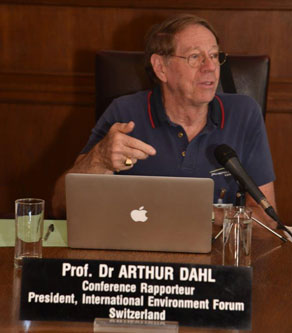 .
. 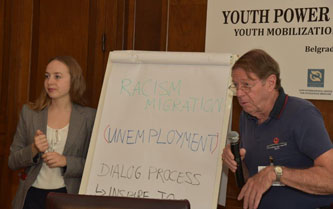 .
. 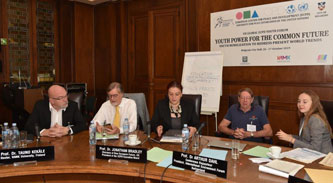
The diversity of participants from many cultures and countries and different academic and practical perspectives was enriching for everyone. Each group summarized their reflections on a large piece of paper and jointly presented their results to everyone present. Participation was so active that the session lasted much longer than planned. Each one went away at the end of the Youth Forum with a wider and deeper understanding of the challenges facing the world and the power of youth to address them.
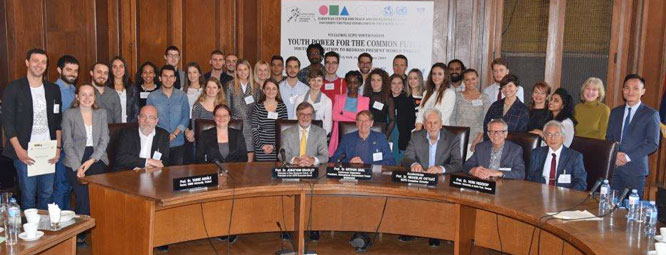
The following are the topics discussed and the conclusion presented during the session.
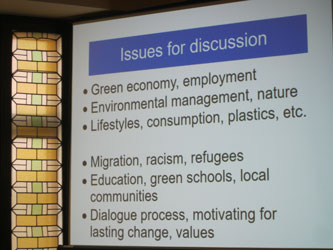 .
. 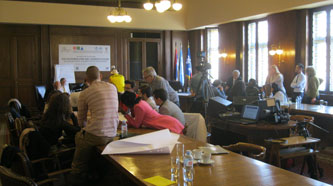 .
. 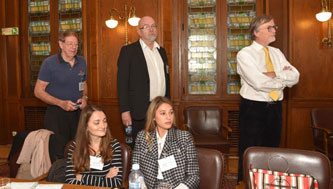
Rules of Household
• Cannot have a green economy in a capitalist system
• What are the rules that will reward people to live more environmentally consciously?
• Grey economy—how does it work? What are the rules?
• Renewable energy is unreliable and not shared well/efficiently
• Areas with surplus and deficit
• Nuclear power?
• Solar panels cause the usage of all of earth metals
• Nomadic blessing: young and old share
• Finland and Sweden both have a policy to link young people who do and create with investment in start-ups by youth
• India has government program yearly to invest in start ups
• Encourage greener/eco-tourism start ups
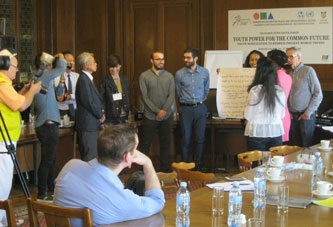 .
. 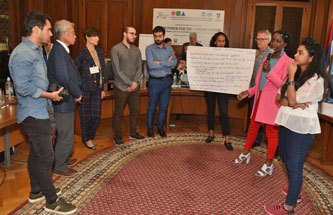 .
. 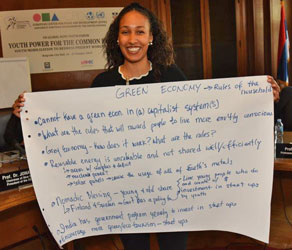
Tourism
• Waste management
• Sustainability
Carbon tax
• Environmental policies
Education
• Culture
• Awareness
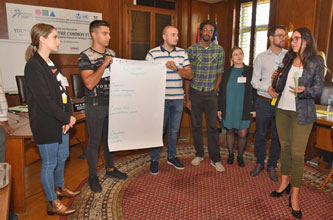 .
. 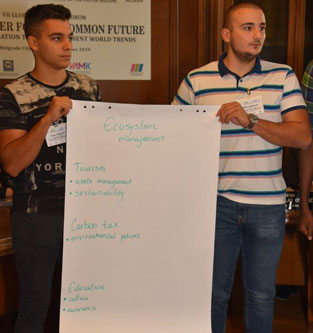 .
. 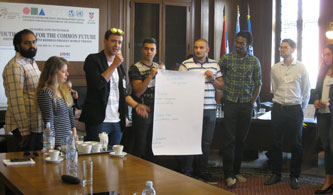
| INDIVIDUAL | COLLECTIVE |
| Open mind to alternatives | Raising awareness |
| Reusable bottles | Stimulating companies |
| Stand by your choice | Media under our influence |
| Speak out | Government support |
| Act together (involve others) | Make alternatives more accessible |
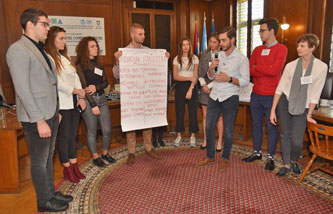 .
. 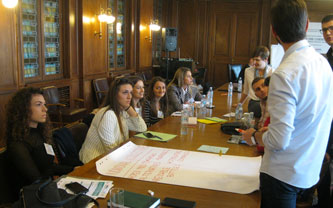 .
. 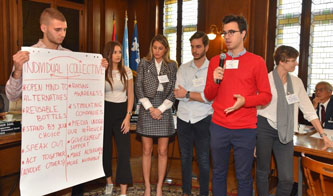
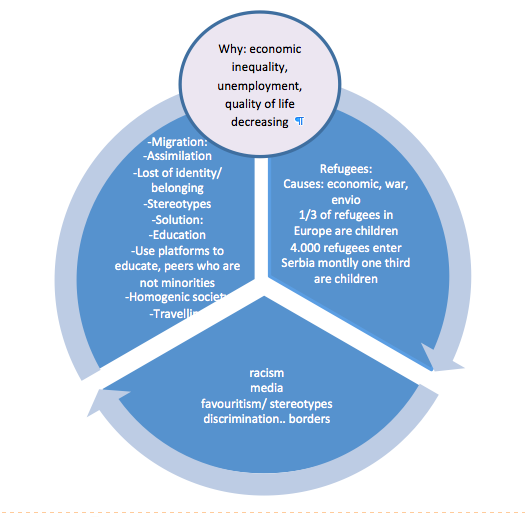
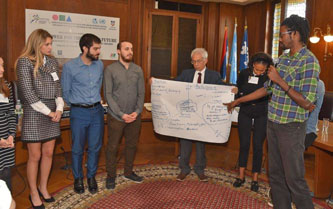 .
. 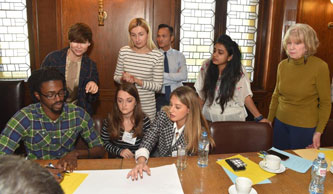 .
. 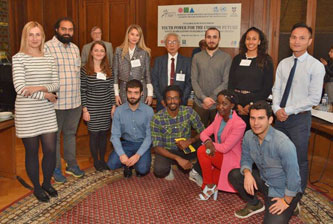
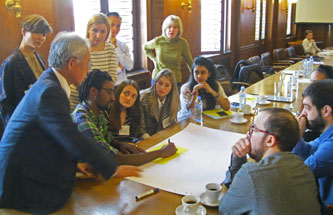 .
. 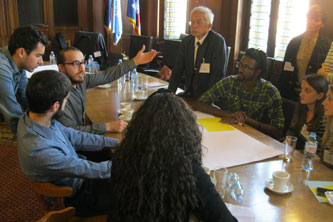 .
. 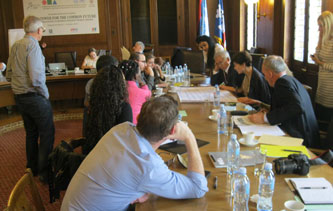
Green Schools; Local Communities
1. Education
• training
• involve parents
• small acts
2. Green schools
• what is a green school?
• how can we reach it?
3. Local communities
• join the movement
• share
• raise awareness
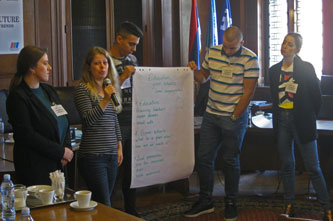 .
. 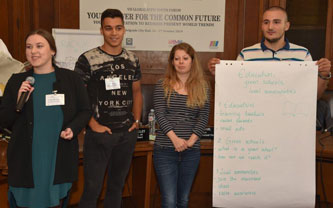 .
. 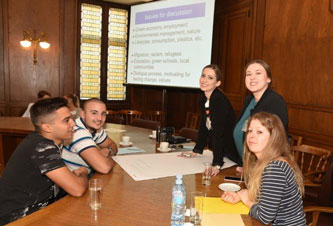
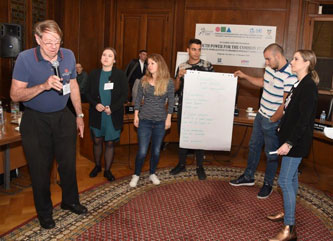
Bridging a link with dialogue
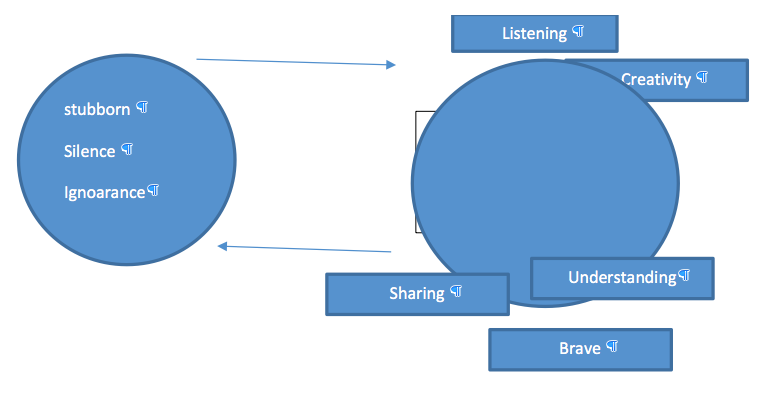
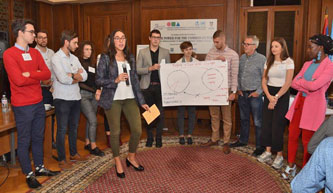 .
. 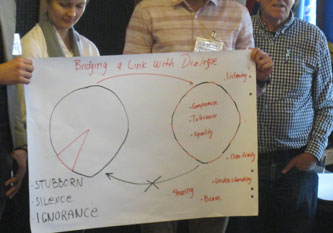 .
. 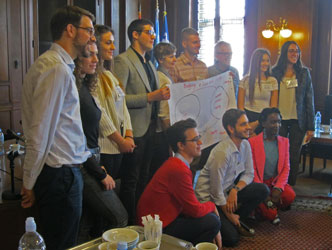
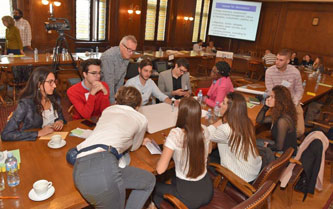 .
. 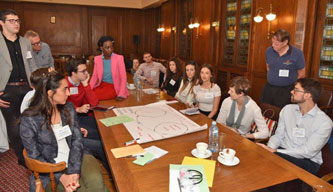 .
. 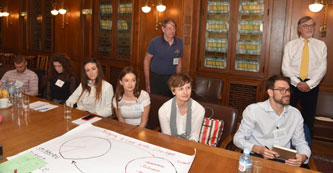
At the end of the Youth Forum, all the participants received Certificates of Participation, and Arthur Dahl was named Visiting Professor at ECPD.
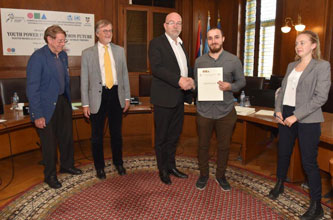 .
. 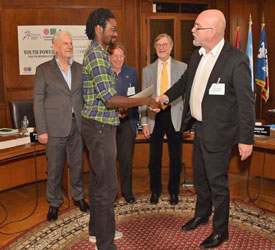 .
. 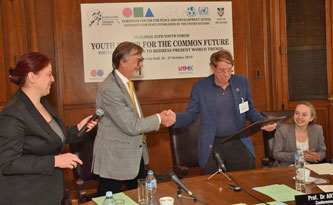
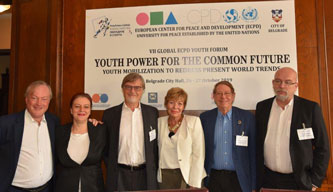 .
. 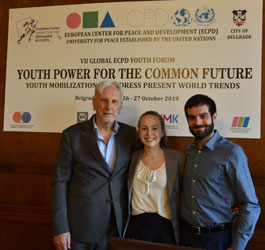 .
. 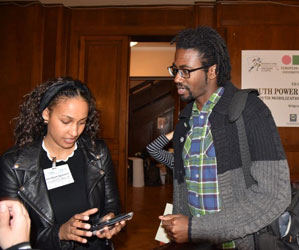
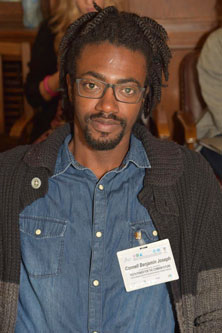 .
. 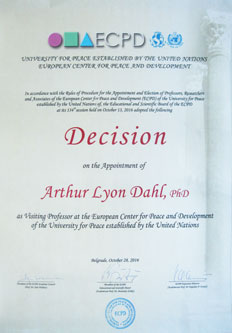
The ECPD Council and members of the Academic Council met just before the conference.
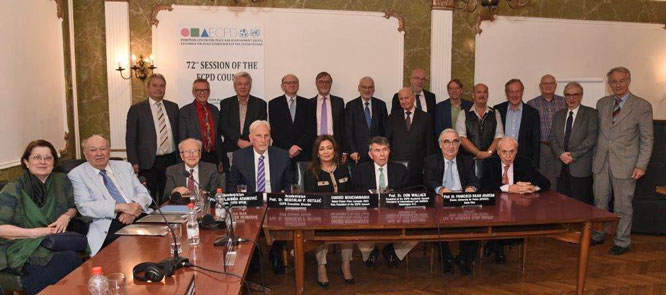
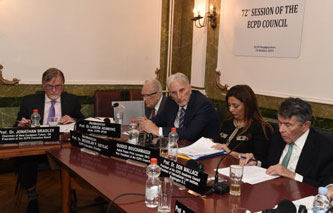 .
. 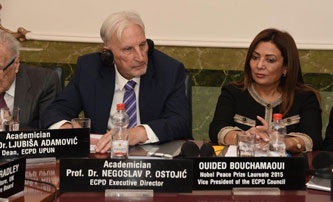 .
. 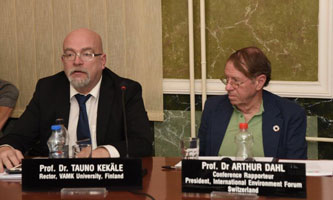
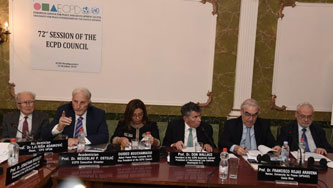 .
. 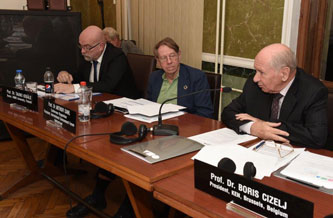 .
. 